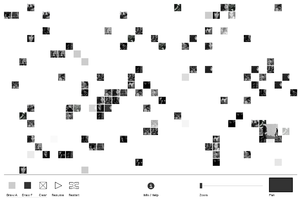User:Emily/NOTES for Own Research & Resource 06
Lev Manovich
- Soft(ware) Cinema
- What does it mean to live in a global information society
- What happens to our subjectivity given enormous amount of data processing everyday (The effects of information technologies on subjectivity)
- Lev Manovich first related the database to cinema in his effort to understand the changing technologies of filmmaking in media landscapes. Cinema privileged narrative as the key form of cultural expression of modern age but the computer age introduced its correlate, the database: "As a cultural form, database represents the world as a list of items and it refuses to oder the list. In contrast, a narrative creates a cause-and-effect trajectory of seemingly unordered items(events). Therefore, database and narrative are natural enemies. Competing for the same territory of human culture, each claims an exclusive right to make meaning out of the world"
Marc Lafia
- The Battle of Algiers
- Formally, the work breaks down cinema's linear structure, proposing an open ended narrative in which the viewer's intervention catalysts a set of events prescribed by predefined rules, which are based on the artists' interpretation of the original work in combination with the inherent nature of its subject.[1]
- Lafia states: “The Vandemar Memex is a rumination on the many fascinating tropes of extended self, distributed narrative, artificial life, collective intelligence and emergent systems.”
- [1] From Tate Intermedia Art, http://www2.tate.org.uk/intermediaart/battle_of_algiers.shtm
- Film, Play,Power and the Computational, or Byting Celluloid by Daniel Coffeen, February 2006
- The film we end up seeing is only one possibility; cut it again and there's a different movie
- Films are based on a database and are authored by a network
- There are films that don't interpret the reel and the screen as univocal but as a machine that winds time and folds place into complex configurations, that stream multiplicity, ambivalence, play.
- The algorithmic dynamics of this The Battle of Algiers move beyond cinema to become a cinema-machine, remaking itself again and again: a veritable reign of images.
Omer Fast
- Spielberg's List(2003)
- Fast creates a layered work in which the idea of memory and what is real is both expanded and put under considerable duress when filmed entertainment turns (in)to history.
- investigations into the relationship between past ans present
- The Casting(2007)
- He anchors this process in his own position as a spectator, which is only possible by involving himself on the screen
The Time Machine In Alphabetic Oder
The Time Machine in alphabetical order is a complete rendition of the 1960's film version of HG Wells Novella re-edited by us into alphabetical order from beginning to end. In doing so, we attempt to perform a kind of time travel on the movie's original time line through the use of a system of classification.
Url:http://www.thomson-craighead.net/docs/thetimemachine.html
24 Hour Psycho
Url:http://copie-copains-club.net/24-hour-psycho/
copies
Url:http://www.eb-mm.net/en/projects/4-million-year-2001 (famous ellipsis of Stanley Kubrick’s film “2001: A Space Odyssey” (1968)) http://eb-mm.net/4MY2001ASO/
Hold on, Emilie Brout & Maxime Marion
http://www.eb-mm.net/en/projects/hold-on
Robert M Ochshorn
a ~60K-row relational database scraped from a German media center/archive as part of a series of artworks for their website.
Data Structure
Jake and Dinos Chapman, Bangwallop, 2011
undesigning : brandjacking
Hemingway THE SUN ALSO RISES
Fitterman MY SONG ALSO RISES
THE SONG SONG ALSO RISES
Black ALSO ALSO ALSO RISES
Richard Prince, Catcher in the Rye, 2011
Derek Beaulieu, Flatland, 2007
Kate Briggs and Lucrezia Russo, The Nabokov Paper, information as material, 2013

